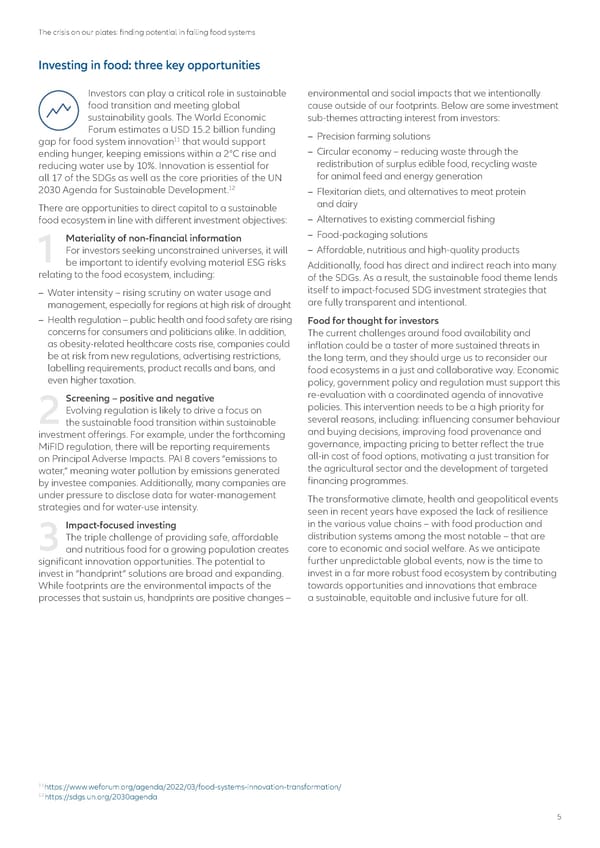The crisis on our plates: finding potential in failing food systems Investing in food: three key opportunities Investors can play a critical role in sustainable environmental and social impacts that we intentionally food transition and meeting global cause outside of our footprints. Below are some investment sustainability goals. The World Economic sub-themes attracting interest from investors: Forum estimates a USD 15.2 billion funding – Precision farming solutions 11 gap for food system innovation that would support ending hunger, keeping emissions within a 2°C rise and – Circular economy – reducing waste through the reducing water use by 10%. Innovation is essential for redistribution of surplus edible food, recycling waste all 17 of the SDGs as well as the core priorities of the UN for animal feed and energy generation 12 2030 Agenda for Sustainable Development. – Flexitarian diets, and alternatives to meat protein There are opportunities to direct capital to a sustainable and dairy food ecosystem in line with different investment objectives: – Alternatives to existing commercial fishing Materiality of non-financial information – Food-packaging solutions 1 For investors seeking unconstrained universes, it will – Affordable, nutritious and high-quality products be important to identify evolving material ESG risks Additionally, food has direct and indirect reach into many relating to the food ecosystem, including: of the SDGs. As a result, the sustainable food theme lends – Water intensity – rising scrutiny on water usage and itself to impact-focused SDG investment strategies that management, especially for regions at high risk of drought are fully transparent and intentional. – Health regulation – public health and food safety are rising Food for thought for investors concerns for consumers and politicians alike. In addition, The current challenges around food availability and as obesity-related healthcare costs rise, companies could inflation could be a taster of more sustained threats in be at risk from new regulations, advertising restrictions, the long term, and they should urge us to reconsider our labelling requirements, product recalls and bans, and food ecosystems in a just and collaborative way. Economic even higher taxation. policy, government policy and regulation must support this Screening – positive and negative re-evaluation with a coordinated agenda of innovative Evolving regulation is likely to drive a focus on policies. This intervention needs to be a high priority for 2the sustainable food transition within sustainable several reasons, including: influencing consumer behaviour investment offerings. For example, under the forthcoming and buying decisions, improving food provenance and MiFID regulation, there will be reporting requirements governance, impacting pricing to better reflect the true on Principal Adverse Impacts. PAI 8 covers “emissions to all-in cost of food options, motivating a just transition for water,” meaning water pollution by emissions generated the agricultural sector and the development of targeted by investee companies. Additionally, many companies are financing programmes. under pressure to disclose data for water-management The transformative climate, health and geopolitical events strategies and for water-use intensity. seen in recent years have exposed the lack of resilience Impact-focused investing in the various value chains – with food production and 3The triple challenge of providing safe, affordable distribution systems among the most notable – that are and nutritious food for a growing population creates core to economic and social welfare. As we anticipate significant innovation opportunities. The potential to further unpredictable global events, now is the time to invest in “handprint” solutions are broad and expanding. invest in a far more robust food ecosystem by contributing While footprints are the environmental impacts of the towards opportunities and innovations that embrace processes that sustain us, handprints are positive changes – a sustainable, equitable and inclusive future for all. 11https://www.weforum.org/agenda/2022/03/food-systems-innovation-transformation/ 12 https://sdgs.un.org/2030agenda 5
 The crisis on our plates: finding potential in failing food systems Page 4 Page 6
The crisis on our plates: finding potential in failing food systems Page 4 Page 6